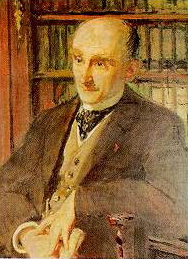
Before January is forgotten, Arts Lust wants to place a memory kiss on the high slender forehead of Henri Bergson. It was 70 years ago on the fourth day of the passing month that Bergson died, at 81, after catching pneumonia while waiting on line in Nazi-occupied Paris to register as a Jew. Bergson was one of the best writers among philosophers, ever. To many people living in the first decades of the 20th Century, that one would have to write a sentence identifying him would be unbelievable, not only because he won the Nobel Prize for literature (in 1927). The Bergsonian idea about living in the world had seeped deep into the reality of the time.
It did so because it offered an unusual mix of an iconoclastic view and a populist one -- iconoclastic if viewed from within the institutional progress of modern scientific thought, populist because he seductively articulated sensations and questions that everyone has -- the personal meditations by which we explore the frontier between the introversion and the external experience. He didn't discount the latter, but put a soulful, animating emphasis on the irreducible value of subjective human feeling.
He saw introspection as an instrument that guides us through the experimental life we live moment to moment. Art embodied the ideal of how inner and outer lives can interact creatively. He asks:
What is the aim of art if not to show us, in nature and in mind, outside of us and within us, things which did not explicitly strike our senses and our consciousness? The poet and the novelist who express a mood certainly do not create it out of nothing; they would not be understood by us if we did not observe within ourselves, up to a certain point, what they say about others. As they speak, shades of emotion and thought appear to us which might long since have been brought out in us but which remained invisible; just like the photographic image which has not yet been plunged into the bath where it will be revealed. The poet is this revealing agent.
If it seems that he's writing exclusively about art, it's not true. I'm quoting from an essay called "The Perception of Change," from a collection called A Study in Metaphysics: The Creative Mind.
It talks about what he calls the "indivisible continuity of change," and his sense of time as a "universal mobility" from which many who contemplate it will be "seized by dizziness" because they insist on "fixed points to which they can attach thoughts and existence."
He argues against fixity, uprooting Victorian vestiges of social, creative and psychological narrowness. The welcoming momentum of his writing lifts you past your own fixity, frees you as you read. His writing makes him a model of someone unafraid of fluidity as an essential characteristic of consciousness: Becoming is the basis of being. He had a revival in the 1960s and '70s because his writing can seem like a precursor to the counter-cultural ethos of the era, one in which aesthetic liberation in poetry, theater, visual art and music galvanized the psychological conviction of human possibilities for artists and non-artists, alike.
Henri-Louis Bergson was the son of a Polish-Jewish musician whose name was changed from Bereksohn, and an Irish-Jewish mother. He was almost as comfortable in English as in French. He never denied his spiritual sense of metaphysical feeling and, before he died, came close to converting to Catholicism. A contemporary thread of his influence, possibly the most vital remaining one, is through his influence on Catholic philosophers.
Scholars have found his influence in the Human Rights Movement. He's also remembered for an incisive essay on laughter. Artists never really forget him. Nor do cultural historians who repeatedly bump into Bergson when writing about major figures.
Sartre, according to biographer Annie Cohen-Solal, discovered his future in philosophy by reading Bergson. The influential American essayist Randolph Bourne heard Bergson speak at Columbia University in 1913, and used his ideas as a building block. Proust is often named as someone who drew on Bergson's sense about the give-and-take between of time and consciousness. Though related to Bergson by marriage -- through Proust's cousin -- the writer didn't give much credit to Bergson's ideas as one would think. Still, reading both of them, it's hard to not see a basic connection.
Frederick Karl, in Franz Kafka: Representative Man, is convinced Kafka read Bergson, who he honors as "a central figure in the later transition from Impressionism into Modernism," and who Karl adds, "warned that the logical mind created continuities where none really existed..."
It's a pity that, like Kafka, Bergson ordered his personal papers destroyed -- that he didn't have an executor-friend like Max Brod to ignore his wishes.
The most direct response to Bergson's death I found was recorded six days afterward, in art historian Bernard Berenson's diary entrée from January 9, 1941.
"Henri Bergson is dead," Berenson writes, before imagining the much-loved philospher's disillusionment, having "to die like this, he who lived through the Dreyfus civil war, and came out believing that France was made safe for humanity and enlightenment; to die while the France he loved so much was abjectly prostrated at the feet of the mechanized, nonhuman foe; to leave at the moment of deepest darkness before one reassuring ray of light could cheer him with its promise -- that indeed is sad."
Portrait of Henri Bergson by J.E. Blanche 1891